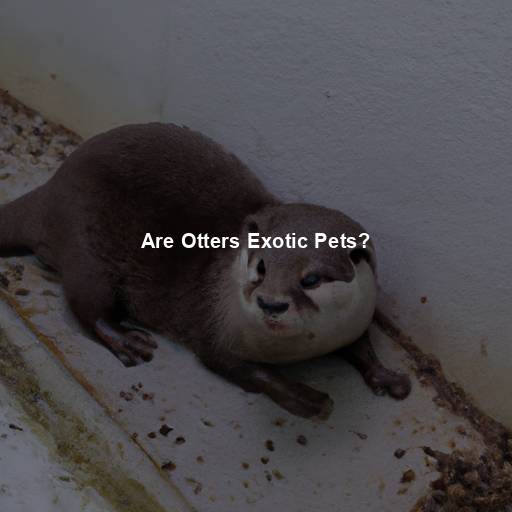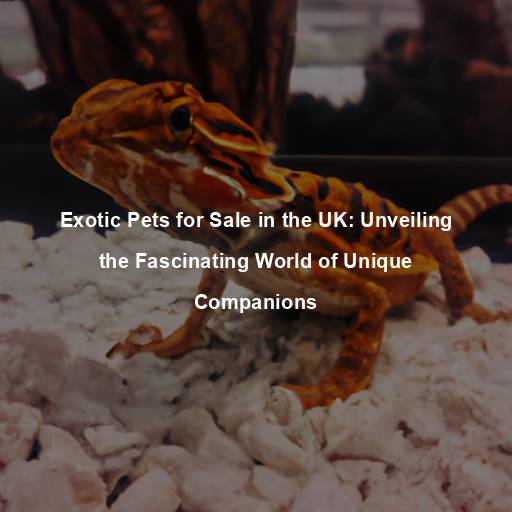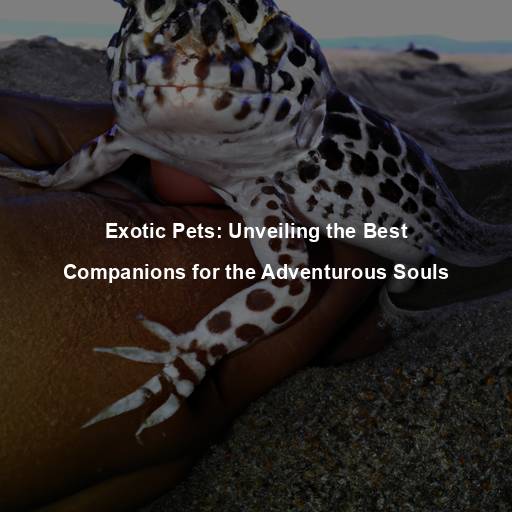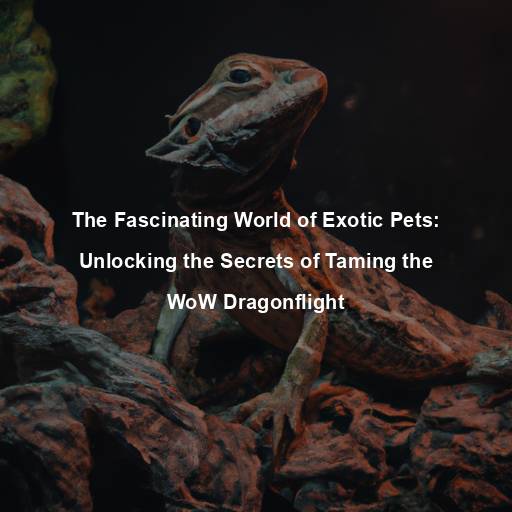Are Otters Exotic Pets?
Last Updated on November 8, 2023 by Evan
Contents
- 1 The Fascination with Exotic Pets
- 2 Understanding Otters
- 3 The Complexity of Owning an Otter
- 4 The Consequences of Owning an Otter
- 5 Ethical Alternatives
- 6 The Legal Landscape of Otter Ownership
- 7 The Unique Needs of Otters
- 8 The Importance of Education and Awareness
- 9 The Potential Risks and Challenges
- 10 The Emotional Impact on Otters
- 11 Responsible Ownership and Conservation Efforts
- 12 FAQs: Are Otters Exotic Pets?
- 12.1 Can I have an otter as a pet?
- 12.2 Are there any legal restrictions on owning otters as pets?
- 12.3 Are otters suitable pets for households or families?
- 12.4 Can otters be kept in captivity?
- 12.5 What are the risks of keeping otters as pets?
- 12.6 Can I interact with otters without keeping them as pets?
The Fascination with Exotic Pets
Exotic pets have always held a certain allure to animal enthusiasts. From colorful reptiles to rare birds, these unique creatures captivate our imagination and beckon us into their exotic world. One such creature that has gained popularity as a potential pet is the otter. With their playful nature and adorable appearance, otters have become a subject of fascination for many.
Understanding Otters
The Natural Habitat of Otters
Discover the enigmatic world of otters, those elusive semi-aquatic mammals that captivate our senses and defy categorization. From the depths of North America to the vast landscapes of Europe, Asia, and Africa, these enigmatic creatures roam with a perplexing grace. With their webbed feet guiding them through the liquid tapestry, their streamlined bodies undoubtedly belong to the aquatic realm. Cloaked in a luxurious coat of fur, like a riddle waiting to be solved, otters plunge into freshwater sanctuaries, relishing in the thrill of the hunt for fish, shellfish, and mysterious aquatic wonders.
Otters as Wild Animals
It’s crucial to grasp the essence of otters as untamed beings whose instinctual tendencies and behaviors defy easy manipulation or transformation. Living in their natural habitat, otters display remarkable sociability, forming tightly bonded familial units where communal activities like grooming, playfulness, and cooperative hunting thrive. Their intricate communication network and profound understanding of hierarchy further accentuate their complex social fabric. Additionally, otters possess distinct dietary preferences and environmental prerequisites that must be met for their optimal physical condition and overall welfare.
The Complexity of Owning an Otter
Legal and Ethical Considerations
Before even considering the idea of owning an otter as a pet, it is crucial to understand the legal and ethical implications associated with it. The laws regarding exotic pet ownership vary from country to country and even within different states or regions. Many countries have strict regulations in place to protect the welfare of exotic animals and prevent their illegal trade. It is essential to research and comply with these laws to avoid any legal repercussions and ensure the well-being of the animal.
Specialized Care and Environment
Taking care of an otter is no walk in the park – it’s a whole wild adventure! These lively critters are always on the move, so make sure you’ve got plenty of room for that otter energy. They can’t settle for just any old water source – it has to be pristine and well-maintained, just like their natural habitats. And let’s not forget about their refined taste in food – these otters are all about the fish, so get ready to go the extra mile in sourcing and prepping their meals.
Socialization and Enrichment
Otters, those charismatic creatures of the wild, are masters of social harmony, finding solace in the embrace of their kinfolk. In their natural habitat, they forge bonds as unyielding as the mighty rivers they call home, indulging in a delightful array of communal activities. However, when confined to captivity, it becomes paramount to offer these playful souls the gift of socialization and intellectual marvels, lest we subject them to the snares of anxiety, wayward behavior, and an unsatisfactory existence.
The Consequences of Owning an Otter
Health Risks
Owning an adorable and mischievous otter may seem like a dream come true, but tread with caution as the world of pet otters is shrouded in a perplexing haze. These captivating creatures may unknowingly carry a host of ailments and parasites, which raise concerns for both their well-being and that of their human companions. Delving deeper into otter ownership reveals a complex web of dietary requirements that demand meticulous attention. Failing to meet their nutritional needs could precipitate an alarming cascade of health woes, including malnutrition, obesity, and an array of other perplexing predicaments.
Ecological Impact
Owning exotic pets may seem alluring, but let’s unpack the hidden consequences that can leave us scratching our heads in disbelief. The insatiable desire for these creatures acts as a catalyst for a clandestine underworld of illegal wildlife trade, wreaking havoc on our delicate ecosystems. Picture this, the removal of otters from their natural abodes, sends shockwaves through the interconnected web of life, leaving us puzzled as we witness its far-reaching implications on fellow species and the tapestry of nature itself. Let’s pause and reevaluate our choices, lest we find ourselves caught in a perplexing predicament of our own making.
Ethical Alternatives
Instead of pursuing the ownership of exotic pets like otters, there are several ethical alternatives that allow individuals to experience the joy of interacting with animals while ensuring their well-being. Visiting reputable wildlife sanctuaries, volunteering at animal rescue centers, or supporting conservation organizations are all ways to engage with animals responsibly and contribute to their conservation efforts.
Captivated by the Charm
The irresistible charm of otters as domestic companions is undeniable. Their mischievous antics, adorable appearance, and playful nature have left animal enthusiasts smitten. The allure of embracing an otter as a loyal companion is understandable—a delightful source of joy and enchantment. Nevertheless, it is imperative to unravel the intricate tapestry of complexities and hurdles that accompany the notion of owning an otter.
A Lifelong Commitment
Brace yourself for the otterly astonishing reality of owning an otter; this is no casual fling, my friend. It’s more like a lifelong odyssey filled with perplexing challenges and boundless bursts of unexpected joy. To embark on this wild journey, you must arm yourself with an arsenal of knowledge, resources, and an unyielding dedication. Prepare to delve into the intricate world of ottercare, from crafting the perfect abode to crafting a menu fit for an otter, and don’t forget the crucial social interactions that they crave.
The Legal Landscape of Otter Ownership
A Complex Legal Framework
Navigating the complex world of otter ownership can be an enigmatic odyssey, with each jurisdiction presenting its own perplexing set of rules. Aspiring otter-keepers must embark on a thorough quest of research to unravel the intricacies of their local laws and regulations. Countless countries hold steadfastly to strict restrictions or even outright prohibitions on adopting these waterborne creatures as companions, citing concerns related to animal welfare and the delicate balance of ecosystems. Hence, it becomes paramount for prospective otter enthusiasts to adhere dutifully to these enigmatic ordinances, safeguarding both legal compliance and the ethereal thread of morality.
Ethical Concerns
The hot debate surrounding the ethics of having otters as household companions continues to baffle and bewilder experts and enthusiasts alike. Advocates assert that responsible custodianship can offer a loving haven to these adorable creatures, but skeptics remain steadfast in their belief that captivity can never fully satiate the intricate demands of wild beings. As we delve into the perplexing realm of otter ownership, it becomes imperative to ponder the potential repercussions of snatching otters away from their natural abodes and disrupting their intricate social dynamics. Exploring ethical alternatives, such as lending support to conservation initiatives and embracing responsible wildlife exploration, presents a more sustainable and empathetic approach towards reveling in the captivating world of these majestic creatures.
The Unique Needs of Otters
Aquatic Habitat Requirements
Creating a home for otters is no simple task. These fascinating creatures, with their unique semi-aquatic nature, demand the best of both worlds: a harmonious blend of land and water. Designing a spacious enclosure that caters to their needs can be perplexing, but fear not, for we have a solution! A paramount element is a pristine water source that calls for scrupulous cleaning and maintenance, ensuring the otter’s well-being is in good hands.
Dietary Considerations
When it comes to feeding these enigmatic creatures, one must dive deep into the mystifying realm of their nutritional requirements. Otters, known for their carnivorous tendencies, have an insatiable appetite for fish. But not just any fish will do – we must ascertain that the piscine delicacies we procure are both of the utmost quality and safety for our eager otter friends. Embracing a diverse menu is crucial to guarantee that these elusive creatures receive all the essential nutrients they need.
Enrichment and Socialization
Otters, those fascinating creatures of the wild, possess an innate need for social connection and intellectual stimulation. Their natural inclination to form tight-knit family units and engage in an array of communal activities makes them one of the most socially dynamic animals on our planet. However, when these captivating creatures find themselves in captivity, it is imperative that we offer them the means to satisfy their intrinsic social requirements. By facilitating interaction with fellow otters or suitable substitutes, we can provide them with the companionship they crave.
The Importance of Education and Awareness
Responsible Ownership Education
Educating potential otter owners about the intricacies of otter care is crucial to ensure the well-being of the animals. It is essential to raise awareness about the legal requirements, ethical considerations, and environmental impact associated with owning otters as pets. Providing access to accurate information, resources, and expert guidance can help prospective owners make informed decisions and understand the dedication and commitment required to provide a suitable and enriching environment for otters.
Conservation and Research Efforts
Supporting conservation and research initiatives is vital for the long-term survival of otter populations in the wild. By contributing to organizations dedicated to otter conservation, individuals can make a positive impact on the species as a whole. These organizations work to protect otter habitats, study their behavior and ecology, and implement conservation strategies that ensure the continued existence of otters in their natural environments.
Financial Considerations
Owning an otter comes with a significant financial burden. The initial cost of acquiring an otter can be substantial, considering the legal fees, permits, and potential travel expenses involved. Additionally, the ongoing expenses of providing a suitable habitat, veterinary care, and a proper diet can add up quickly. Otters require a specialized diet consisting primarily of fish, which can be expensive to maintain.
Time and Commitment
Taking care of an otter is no small task. These spirited creatures demand constant attention and effort. From engaging them in daily exercises to stimulating their curious minds, there’s never a dull moment. Not to mention the meticulous upkeep of their enclosure and water filtration systems, ensuring a clean and healthy habitat.
The Potential Risks and Challenges
Aggression and Destructive Behavior
Despite their undeniable charm, otters possess a fascinating blend of instincts that can sometimes present perplexing behaviors. These creatures thrive on their inquisitive and lively nature, yet their playfulness can swiftly morph into aggression, particularly if they perceive any form of danger or find themselves in uncharted territory. Equipped with sharp teeth and menacing claws, they may inadvertently cause harm or succumb to destructive tendencies like gnawing on cherished furnishings or personal possessions. While early training and socialization can go a long way in preventing such inconveniences, it is crucial to remain prepared for the burst of challenges that may unexpectedly arise.
Zoonotic Diseases
One of the significant concerns when owning an otter is the risk of zoonotic diseases. Otters can carry various pathogens, including bacteria and parasites, some of which can be transmitted to humans. Close contact with an otter, particularly through bites or scratches, increases the risk of infection. It is vital to take necessary precautions, such as regular veterinary check-ups, practicing good hygiene, and following proper handling procedures, to mitigate the risk of zoonotic diseases and ensure the safety of both the otter and its owner.
The Emotional Impact on Otters
Psychological Well-being
Otters possess complex emotional lives and have specific social and environmental needs. In the wild, they live in tight-knit family groups and engage in a wide range of social behaviors. Captivity can often lead to stress, anxiety, and other psychological issues in otters if their social and mental stimulation needs are not adequately met. It is crucial for otter owners to provide a stimulating and enriching environment that mimics their natural habitat as closely as possible.
Bonding and Attachment
While otters may develop strong bonds with their human caregivers, it is important to remember that they are still wild animals. Their innate instincts and behaviors cannot be entirely overridden, and they may not form the same level of attachment as domesticated animals. Understanding and respecting the otter’s natural instincts and limitations is essential to prevent potential disappointment or unrealistic expectations regarding the depth of the human-animal bond.
Responsible Ownership and Conservation Efforts
Research and Education
Responsible ownership of otters begins with thorough research and education. It is crucial to gather information from reputable sources, consult with experts, and join communities of otter owners and enthusiasts. By staying informed about the latest advancements in otter care and welfare, owners can make well-informed decisions and provide the best possible care for their otters.
Supporting Conservation Initiatives
Choosing not to own an otter as a pet does not mean missing out on opportunities to appreciate and help conservation efforts. Supporting organizations dedicated to otter conservation through donations, volunteering, or participating in research initiatives can have a significant impact on the preservation of otter species and their natural habitats. By redirecting our passion and resources towards these efforts, we can contribute to the long-term well-being of otters and help ensure their survival in the wild.
FAQs: Are Otters Exotic Pets?
Can I have an otter as a pet?
Keeping an otter as a pet might sound tempting, but it’s not a decision to be taken lightly. These adorable creatures have unique needs that can be quite perplexing to fulfill in a home environment. They demand vast amounts of space for frolicking, clean water for their aquatic adventures, a specialized diet, and proper veterinary care tailored to their specific requirements. Moreover, laws in several countries restrict or prohibit the ownership of otters due to their protected status and the potential havoc they can wreak on ecosystems if released.
Are there any legal restrictions on owning otters as pets?
Yes, many countries have strict laws and regulations regarding owning otters as pets. Since otters belong to protected species, it is prohibited to capture, keep, or sell them. Even countries where otters may be legal to own as pets require specialized permits or licenses and require certain standards to be met. It is crucial to thoroughly research and abide by local laws and regulations before considering keeping an otter as a pet.
Are otters suitable pets for households or families?
Keeping otters as pets may seem enticing, but it’s important to remember that they are not your typical household companions. Their complex needs and behaviors demand specific conditions and environments. With their boundless energy and love for water, otters require a spacious aquatic habitat, like a pond or pool, to truly flourish. Additionally, their potent jaws and sharp teeth can pose a safety risk, particularly when they feel scared or endangered. Moreover, otters are solitary creatures, and their socialization requirements differ greatly from the more domesticated pets we are accustomed to. As tempting as it may be to have an otter as a pet, it’s crucial to acknowledge the burst of challenges and perplexities that come with it.
Can otters be kept in captivity?
Keeping otters in captivity is indeed a possibility, but it’s a complex endeavor that involves obtaining the necessary permits, licenses, and specialized facilities. Zoos, aquariums, and wildlife sanctuaries that boast a team of knowledgeable staff and adequate resources are the likely candidates for such an undertaking. These institutions are equipped to meet the unique requirements of otters, including providing them with the right diet, opportunities for socializing with their fellow otters, and mental stimulation. It’s important to note that otters are typically kept in captivity for educational and conservation purposes rather than as domestic pets.
What are the risks of keeping otters as pets?
Keeping otters as pets comes with considerable risks and challenges. In addition to legal implications, otters have specific health and dietary requirements that can be difficult to meet outside of a professional setting. They may develop aggression due to their wild instincts, potentially causing harm to their owners or other household pets. Otters are also known carriers of diseases, some of which can be transmitted to humans. Proper containment, sanitation, and veterinary care are necessary, but even then, it is challenging to provide the optimal conditions for their well-being in a domestic environment.
Can I interact with otters without keeping them as pets?
Yes, there are alternatives to interact with otters without owning them as pets. Many wildlife centers, zoos, and sanctuaries offer educational programs or experiences where you can observe and learn about otters up close. These establishments provide a controlled and safe environment where you can appreciate the beauty and behaviors of otters while ensuring their well-being and conservation. Additionally, you can support organizations working towards otter conservation through donations or volunteering opportunities.







